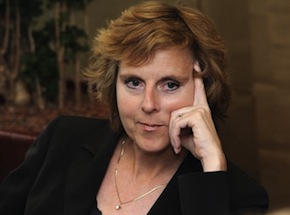Advice from Europe for California’s cap-and-trade captains
As California lurches toward what would be the nation’s most comprehensive carbon trading program, I got an interesting perspective from the world’s largest, the European Union. “California is one of the states that is actually moving forward in the US,” EU Commissioner Connie Hedegaard told me in a one-on-one interview this week. “And we know in Europe that sometimes when California starts to do something, that it’s the start of something that will end up being the American way of doing things.”

Hedegaard, who is the EU’s Commissioner for Climate Action, cited California’s leadership in regulating tailpipe emissions, among others, though when it comes to cap-and-trade for carbon, it’s unclear who will be following. Certainly Congress is in no mood, and the regional trading scheme known as the Western Climate Initiative has been severely stunted.
Citing recent estimates that five years of carbon trading in Europe has lowered total greenhouse gas emissions by less than one percent, I asked her if she considers that a success. “Yes, I do,” replied Hedegaard. She countered with her own figures that while US emissions had continued to rise between 1990 and 2009, those in Europe had fallen 16%. “So we’re doing something right,” she said (again, EU carbon trading only began in 2005). “Of course when you’re building a complex system like that, those who do it first, in the first couple of years, have a lot of lessons learned.”
Hedegaard said documented incidents of hacking and fraud in the European carbon market were part of the learning curve. When I asked what the biggest lesson in the Euro-experience might be for California, she said,”Do not give out too many allowances for free.” The pollution permits traded among companies in a cap-and-trade system are known as “allowances.” Whether to give them away or make industry pay for them is an ongoing point of contention. California regulators have chosen to begin by giving away the lion’s share of permits at first, ramping up to a system of auctioned allowances.
In the wake of the seismically-induced nuclear tragedy in Japan, Hedegaard says she thinks that shifts in attitudes toward nuclear power will vary widely among European nations. “The fact is we have 143 nuclear power plants in Europe and they’re not going away any time soon,” she said. Hedegaard said officials will be performing “stress tests” on all 143 plants. “We have a responsibility to not make people panic now,” she said — but concedes that the “tailwind” that was building in Europe for nuclear power has evaporated. “That is gone,” said Hedegaard. “That is the political reality as I see it.”
My entire interview with Hedegaard airs tonight on KQED’s This Week in Northern California and will be posted to that program’s website this weekend.
3 thoughts on “EU Lesson for CA: Don’t Give Away the Store”
Comments are closed.

Does Mr. Miller’s full interview disclose that Hedegaard is in California to discuss linking the EU’s emissions trading with thoce of California? — http://www.guardian.co.uk/environment/2011/apr/07/eu-emissions-trading-california
With us, Hedegaard was a bit circumspect about the substance of her meetings in California, saying only that they discussed ways they might cooperate. In the Guardian article, which appeared the day after our interview was recorded, it’s still unclear exactly what is meant by “linking” the two trading markets. In retrospect I would like to have pressed the issue more with her. But thanks for the link. It’s definitely something to watch.
After The Guardian piece appeared, I checked in with both CA and EU officials, both of whom deny that they are actively pursuing a “linked” market. Kasper Zeuthen, Senior Press Officer for Hedegaard, says simply that The Guardian “got it wrong.” Zeuthen says “She never talked about linking systems. She said that if California develops a cap and trade system we should try to ensure it is compatible with the European.”
Likewise during a carbon trading conference last week, CARB executive director James Goldstene said that while the two are sharing information, “At the moment there’s no commitment for linking to the EU.”